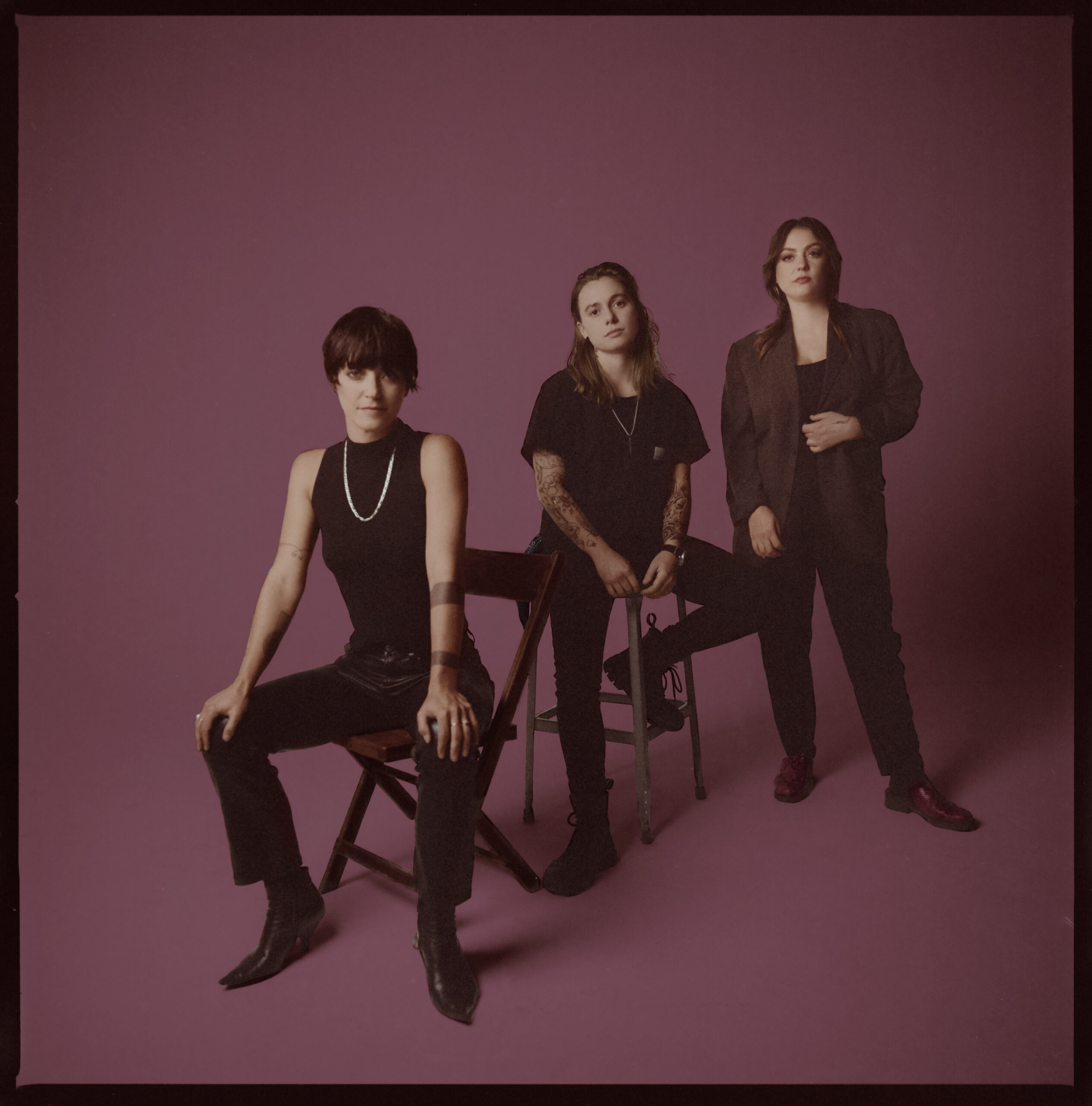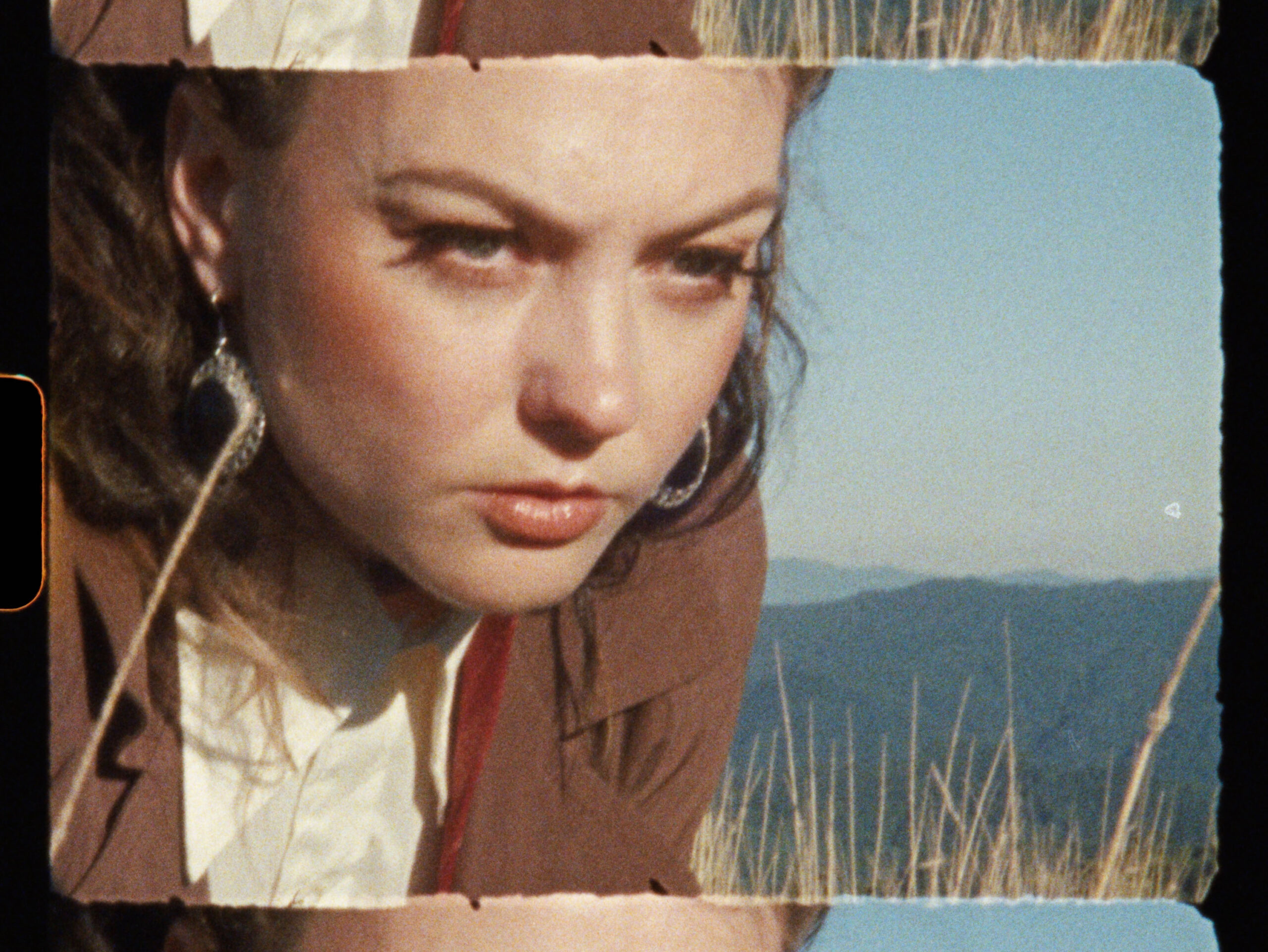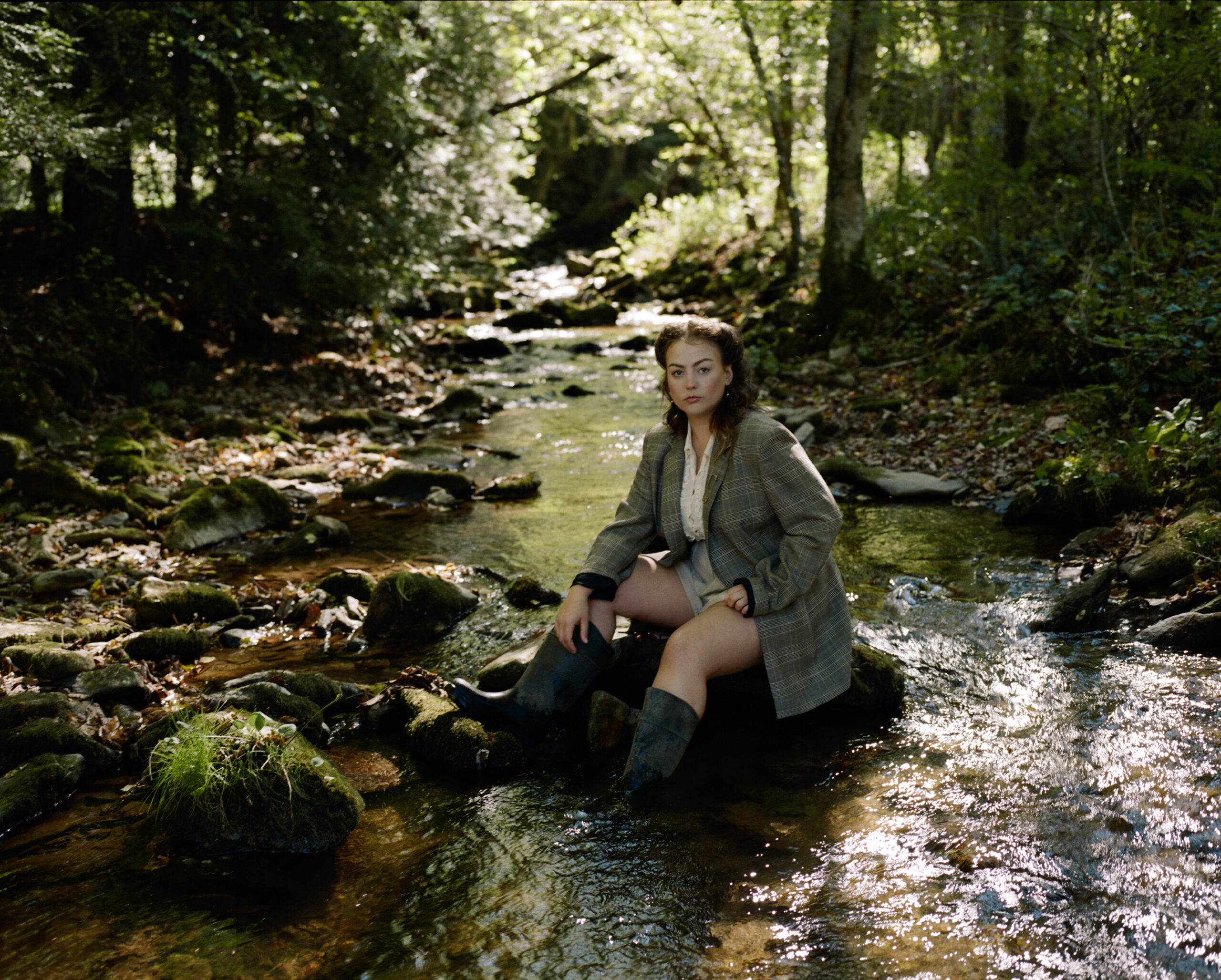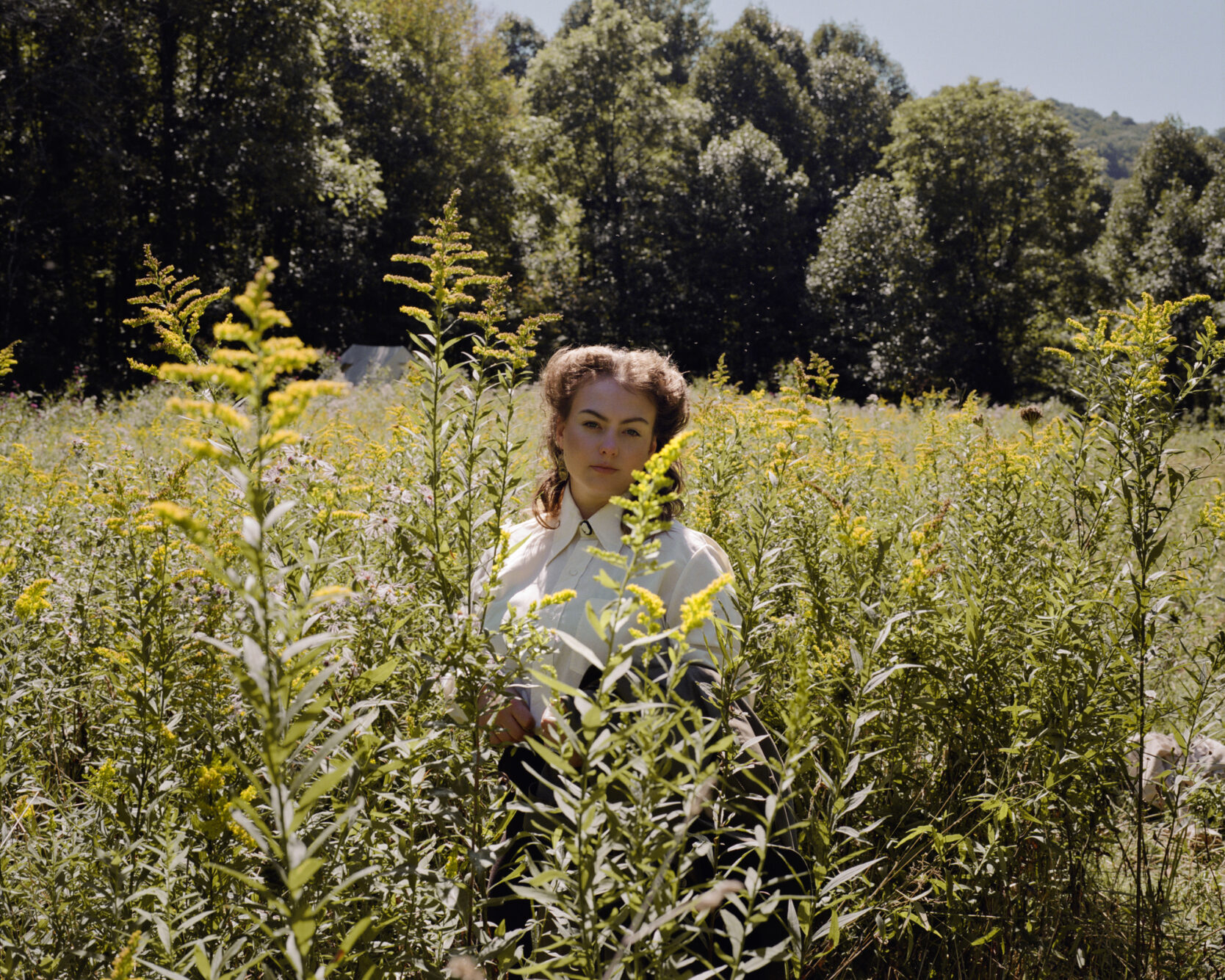For Angel Olsen, 2022 was in many ways about continuing to process the events of the past two years, which, beyond the onset of the COVID-19 pandemic, encompassed a painful breakup, starting a new relationship, and coming out to her parents as queer. Her father died three days after she told them; her mother died weeks later.
Despite these experiences, Olsen emerged with the Jonathan Wilson-co-produced album Big Time, a return to her folk roots after a period of exploring different genres. She also toured with like-minded artists Sharon Van Etten and Julien Baker. “I had gone through a lot of things that I can’t really talk about publicly — some of it was my parents passing away and some of it was health and relationship stuff,” says Olsen. These challenging events slowed her down and “fucked with” her, but also allowed her to view her work through a different, illuminating perspective.
“I don’t feel grateful that shitty things happened all in a row, but I’ve had a really pure, eye-opening, approach to my music and the audience and what I do for the first time in years,” the singer/songwriter notes. “There’s nothing to fear anymore. Just connect with people and be good to yourself. So much of my career has been traveling and not enjoying it and really trying to work my ass off for some nomination. I’m finally at a point where I can do this for me.”
Olsen has big plans for 2023. She’s going on tour in mid-January and playing Red Rocks with Jason Isbell for two nights in the spring. She’s also working on a project was a collaborator she politely declines to identify. Looking back at 2022, Olsen reflects on touring with Van Etten and Baker, the book she wants to write, and what kind of music might be coming next.
SPIN: The Wild Hearts tour was one of the highlights of your year. What was it like to go back out on the road for your first proper tour since the pandemic?
Angel Olsen: I feel really humbled by the pandemic and by my experience. It allowed me to really just appreciate touring, even if it wasn’t looking the same and the audiences were smaller because of the pandemic and things happening in the world. Also, just being on tour with Sharon [Van Etten] and Julien [Baker] and Quinn [Christopherson], and being in a caravan of bands … it was really fun.
It’s cool also to just be at a point in my career where I’m not threatened to make choices where I collaborate with people who have been … Sharon and I have been compared to each other so much. I also think so much of my early career was just making sure you are the unique female artist. It’s so stupid. Now, there are so many [women in indie]. But I remember when [people thought] you can only have one, which is just simply not true.

With so many talented women in the industry finally getting their time to shine, it seems like there’s less pressure to jump through hoops to cater to what the industry and fans think you should be.
Yeah. The thing is, people will always say what they want to say about it because they’re seeing it through their lens. I just am learning to let go of that more and more. It’s taken years of therapy to balance wanting to care about how my music is perceived, but letting go of it if it’s not perceived the way I’d like it to be. I would be lying to myself if I were like, ‘Oh, it doesn’t matter what people think of my music.’ That’s not necessarily true. But I am at a point where I feel more comfortable taking risks.
You have a document prepared for journalists that lists topics that are off-limits. It’s surprising, because you’re someone who doesn’t hold back in interviews. Does it feel like having something like that helps you take control of how your personal life and work are presented without having it be warped through somebody else’s lens?
It is funny, because I change my mind so much. I think I just have to forgive myself for being protective and changing my mind. But all I can do is try to set some boundaries and then update them whenever I feel differently. I think it’s really easy to talk. I forget that, for example, because I’m not afraid to talk about it now, but at the beginning of my career, I really didn’t want to talk about my adoption. I think it’s one of those things that I forget. That it’s a stigma or it’s a thing that if you’re at a party or you’re around anybody and you say you’re adopted, someone’s like, ‘Oh, how was that?’ So I get it, but I just didn’t want my whole career to be, ‘And she’s adopted!’ So I was just like, ‘Why don’t we not talk about that for a little while?’
One day maybe I’ll write a book about it if I feel I can get to a place where I won’t psychoanalyze even my own projections of myself. I feel like I would be one of those people who writes a book at 36 years old and calls it something clever. But I would hate myself for putting something out and then being annoyed at myself for putting this out so soon.
Adoption is a no, relationships a no. But those are normal things to not want strangers to fixate on. It’s great that Big Time is a celebration of you coming out, while also tackling the heavy moments in your life that have come since then, like your breakups and your parents’ death. But I think people assume that because you’re so open about that in your music, you owe them access to the most invasive information.
To be honest, sometimes it’s really kind people who are doing their job as a journalist and they’re asking things like, ‘Can I contact your biological mother?’ And I’m like, ‘I don’t know why your editor thought that would be okay. But absolutely not. No, I don’t think that that would be okay for you to contact my biological mother as part of this interview. I think that, that’s really fucked up. And I wouldn’t have agreed to do the article with you, had I known that would’ve been your intention.’
That’s the reason why I am so protective, because it is no one’s business. I share a lot of myself and I’m so willing to share the depths of my disappointments through my music and my experiences. Why do you need more? I just don’t understand. I’m giving everything. It’s all out there in the music [and] in what I say about the music.
I’ve had interviews on this record about my parents and stuff and they’re like, ‘How are you?’ And I’m like, ‘I’m OK. How are you?’ They’re like, ‘Well, this is a very personal record.’ And then they state, ‘So, your parents died.’ You don’t have to state the facts for me before you ask me a question. We already know that.
It is interesting finding out in interviews how people deal with death because everyone is afraid to say it out loud. I just find it so funny. I’m like, ‘Oh, the inevitable truth of everyone.’ Yeah, that did happen. But I think I give as much of myself as I possibly can. There should be space for me though, to protect myself a little bit.
I remember reading you had written a 10-page essay explaining Big Time and your thoughts and feelings from the time it was written. Do you think you’ll ever share that?
I don’t know. I did it as an exercise to just figure out what was in it that we could use. And then I feel the label [thought] this needs to be [written] from someone else’s perspective because you’re so in it, and they weren’t wrong. But it did make me think for a while that maybe I should be writing other things. It’s scary to act or it’s scary to risk what you are good at by trying something else not good at, or you’re still learning things about in a public way.
Hopefully, maybe one day I’ll write a book of essays that’s not necessarily all autobiographical, but some that are just some words that are autobiographical and some that aren’t. I think that would be more my style than to be, ‘and it all happened here.’ But I wish that I could let go of how much of a writer I am sometimes, because when I listen back to interviews, and I mean this as a musician, I just wish I could just give something to people.
I’m so protective of the intention of the thing that I want to talk about it philosophically with the person because it’s important to me. I think for me, I need to let other people interpret things more and just let go of that as a writer. I’ve just spent a lot of time thinking about every process of what I do. And it’s part of why I have been so deeply disappointed when people misinterpret it.
You were working on a screenplay. What is happening with that?
The screenplay’s finished, but I need to write the book. Because if I ever want to do anything with it, it has to be a book first. That’s just how these things work. You can’t just be like, ‘I’m a musician, and I want to be a screenwriter.’
But I did it as an exercise to just see if I could do it. It’s not the most amazing piece of work. I don’t know how people make films, because as a director and writer and all this stuff, I’m down to just write it and get it out of the way. Sitting with a film for two-and-a-half, three years, through the whole process of it, watching it change dramatically from where you thought you wanted it to be based on what the producers say and the people who are spending the money on it … it just sounds so fucking unrewarding. That’s part of why I like making music videos, because you can do so much and you can make music so quickly that I don’t know if I have the capacity or patience to make something that takes that much time away from my life emotionally.
Your work keeps evolving, with you working on many projects at a time and often taking on different genres. What was it like to return to your folk roots for Big Time after so many years of experimentation?
I released an Americana record and I’m so proud of it. Of all my work, I think it’s probably the most accessible. Not accessible — what’s the word? It’s all one piece, whereas other records are a mixed bag of different styles of things that I’ve acquired throughout the years. This one feels more concrete, from start to end, which I’m proud of.
And yet I know that musically I’ll probably go on to do something completely different. I was thinking today as I was driving around, ‘Why can’t I just turn out the same genre? I don’t know what’s wrong with me?’ But I just have to keep changing it up. And it’s not always by choice — it’s just subconscious, like, ‘Oh, this is what I’m into right now.’ So, I don’t know what’s next, but I don’t think it’s Americana.
At least this year you kept it simple with just Big Time. Last year you had so much going on, with Whole New Mess [an alternate version of All Mirrors] and your ’80s covers EP, Aisles. You’re keeping fans on the edge of their seats wondering what you’ll do next.
I know. And I think it’s been almost to my detriment that I keep changing. I feel I am successful. But I think if I made vibe music, my music would probably reach more people. It’s just something I think about a lot. I just need to make a record that’s just vibes … just hardly understandable lyrics with really nice, floaty sounds. Something they can play at the local H&M or something.
Because what I’m doing is, I put everything of me into [my music] and I psychoanalyze it and I make it this thing. I need to just chill. I listen to a lot of music that’s not lyrical — mainly Brian Eno — and not everything has to be a story. I’m trying to embrace that more in my writing, without necessarily falling into your typical vibe music.
I’m not trying to be Meryl Streep with my career. I just like to explore. I never want to get bored, and I never want to be boring. I want to always just push it a little bit. And it has been to my detriment, I think, a little bit. But that’s okay. Because I don’t want to be stuck producing the same shit.

Are you already beginning to work on whatever’s next?
I’m working on something now that I’m probably just going to self-release or release under my label, maybe. That’s the hope. I don’t want to make something that’s heavily produced every time. And I want to have more opportunities to do that without risking everything and having to do every single thing to keep up with the current. I just want to make something without everybody having their hand in it. I want to take risks and be weird and have the opportunity to do that. I loved talking about Big Time, even if it was hard because that record was really meaningful to me. It was just crazy that I even went into the studio that early after everything that happened.
But I just felt [producer] Jonathan [Wilson] and everybody involved in the record really understood this space. They understood what I was going for. I didn’t have to over-explain. So it was really nice to make a record where I had the words to say what I wanted and it was understood.
I saw your Instagram post that was a half-joking obit to your iconic bangs, which you’ve been growing out throughout the year. You wrote that you’re no longer hiding behind the frame. Do you actually feel that way?
No. It was really fun to say that though!
It’s easy to buy it either way because it’s been such a big year of transformation for you.
The whole campaign for the record was just trying to be cheeky. And then some of it was, we were getting really into ’70s ads, and my manager was like, ‘what if we did ’70s ads for the campaign?’ I was like, ‘Ooh, I love ’70 ads, where they’re over-explained or they’ll say things that are just very apparent.’
So I was like, ‘Let’s just be weird in our advertising about this. Let’s have fun with it.’ I think that was just one of the many things that fell into line with that. But for me, I’m going to keep changing. I do know that I feel like myself and I feel I’m still me throughout all of the changes. I’d gone through a breakup. When you go through a breakup, you get a haircut, and you’ve got to cut off the grief a little bit. I thought I needed something else. I need to look different for a little while. But I finally feel mostly back to myself.

After such a difficult 2021, it seems like you’re getting more in touch with yourself now and relearning who you are, too.
I think that the pandemic still left a low-grade depression on everybody. But it really, really was a hard time for me personally because of what had happened in my life. I just separated from my body. And now I’m like, ‘Huh, people don’t just drink all day because it’s the end of the world. It is the end of the world, still. But we have to try [to persevere].’
Part of that is taking care of your body and your mind, making sure that you’re connecting with people, and not letting yourself get into these patterns of being alone and convincing yourself of negativity. I’m glad there are distractions so that I can doomscroll sometimes, because I don’t know if I have the space to hold all of it. I am grateful that I live in a place where I can go out into nature and forget about people and forget about what I do, and I don’t have to be up against it all the time.
But there’s so much that has happened and I am still emotionally processing all of it. And so I’m thankful that I had music to work on. People might think it’s crazy to make a record when your parents die or to do something like that, but it’s really important to exorcize those feelings and get them out and start the process of grieving, instead of trying to numb yourself to it. You can’t compartmentalize dealing with that. It just comes up in its own ways at different times for different reasons. You have to continue working through it.





